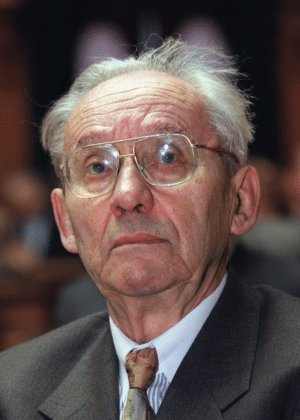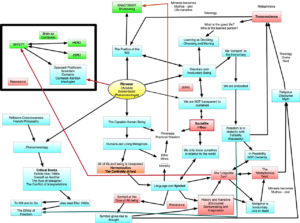
It is from these sources that SPoR orients itself to risk. Such an orientation is practical, positive and constructive in how it helps persons tackle risk.
One of the best ways to understand SPoR is through Semiotics. In this way one can see the connection and relationships between concepts, ideas, values and principles. It is from this Methodology that SPoR has developed its methods (https://www.humandymensions.com/product/spor-and-semiotics/). You can see a map of Ricoeur’s philosophy at Figure 1. Semiotic Map of Paul Ricoeur.
Figure 1. Semiotic Map of Paul Ricoeur

The philosophy that undergirds SPoR is focused on an Existentialist Phenomenological Dialectic. This has been discussed in a number of books in the SPoR series on risk, all for free download (https://www.humandymensions.com/shop/). The philosophy of Ricoeur is in direct opposition to the philosophies of: Scientism, Positivism, Behaviourism and Reductionism that undergird Safety.
It is unfortunate that the safety industry shows little interest in Methodology/Philosophy hence why most don’t know the bias of their method nor what philosophy dominates the industry. Indeed, the naivety of the industry towards understanding itself is one of its cultural characteristics. Often Philosophy is understood by the industry as irrelevant to practice. Such a binary construct is also a characteristic of the industry. Often there is a huge shock when Safety is finally brought into a court where they face very clever lawyers (https://safetyrisk.net/proving-safety-a-book-review/) who know how Methodology drives method.
Semiotics is NOT self-explanatory and so the map above requires some significant unpacking, discussion and dialogue to get a hold of what Ricoeur was on about. We work though this in the SPoR Philosophy in Module 23 (https://cllr.com.au/product/philosophy-and-spor-module-23/).
For those in Safety who don’t want to know about philosophy it seems as if SPoR is just some preoccupation with oppositionalism. In such circles the word ‘philosophy’ is used in a meaningless way and has very little to do with philosophy. The reality is, SPoR has a deeply formed Methodology that finds the methods of Safety: alienating, dehumanising, mechanistic and naïve. In Safety, very few could name their philosophy just as most who believe in zero have little idea of its ideology (https://www.humandymensions.com/product/zero-the-great-safety-delusion/ ). In its continued naivety, Safety regards zero as a number or a goal yet believe so against all we know of personhood, ethics and fallibility. This is why zero organisations end up twisting themselves up in knots and linguistic gymnastics try to make sense of zero. The zero argument is an argument founded on ethical ignorance.
One’s ethic is the outcome of one’s philosophy/methodology. This is how we get academics in safety (with no expertise in ethics) declaring that zero is a moral goal (https://safetyrisk.net/zero-is-an-immoral-goal/ ).
We also see in the not-so-differently movement use of the word ‘philosophy’ that means a collection of ideas, principles and slogans. In such a view we see the hallmarks of positive psychology with no discussion of its underlying philosophy. Similarly, we see in the AIHS BoK a collection of chapters based on Behaviourism, Positivism and a Deontological ethic that is never acknowledged. Again, what we see is, a naivety about philosophy, methodology, ethics and the nonsense of objectivity.
One of the great contributions Ricoeur made to philosophy was his work on Hermeneutics (https://archive.org/details/hermeneuticshuma0000ricu ), the study of interpretation. Ricoeur’s work on domination (https://www.terapiacognitiva.eu/cpc/dwl/pr/RicoeurandHermeneutics.pdf) is extremely important in understanding the way power works in the risk and safety industry. This is why there can be no psychological safety in zero (https://safetyrisk.net/no-psychological-safety-in-zero/).
If Safety were to acknowledge that all risk, decision making, regulation and policy were interpreted, it would be a very different industry. What we have in safety is the opposite, the naïve belief that Safety is somehow objective, measurable and scientific. It is none of these.
Ricoeur’s hermeneutics is especially relevant to an understanding of symbols in what he calls ‘a dialectic of suspicion and faith’ (https://www.researchgate.net/publication/265477825_Paul_Ricoeur%27s_Hermeneutics_of_Symbols_A_Critical_Dialectic_of_Suspicion_and_Faith).
We will be tackling some of Ricouer’s work in our module on Linguistics that starts next week (https://safetyrisk.net/online-study-linguistics-and-risk/). Studying Linguistics (https://safetyrisk.net/culture-silences-in-safety-linguistics/) is just one of the many silences in Safety regarding risk.
One of the current participants in this Linguistics program wrote this yesterday in response to reading in preparation for the module:
A thought came to me early this morning. There’s a phrase I keep hearing at nearly every meeting; “We need to cascade that information.” It’s become part of the lexicon.
If I consider information-as-liquid, to remain consistent, it can only every ‘flow’ from high to low. That’s what liquids do. Management down to workers. This is certainly how I experience information in this sub-culture. It also reminds me of your funnel diagramme pg 7 Following-Leading in Risk. Unless we engage some sort of engineering device, liquids never flow up. I’ve never heard the phrase, “We better pump that up to the top.” The partial use hides the unilateral movement.
What if we were to consider information-as-gifts? Then my experience would be entirely different. We eagerly exchange gifts. We love to give as well as receive. That would align with your reciprocal relationship diagram on page 68.
This is how an understanding of hermeneutics and Linguistics gives one an insight into how the Safety industry shapes the way people interpret risk. It is also amazing just how many military metaphors are used in this industry to try an explain itself. Such is the prevalence of the metaphor of dominion in the industry. The best way to start to shift culture is to talk about it with a knowledge of Linguistics. Changing language is the beginning of changing culture.
This is where Ricoeur helps in deconstructing the messaging of Safety that dehumanises persons. What Ricoeur offers is a different worldview in understanding persons in a positive, constructive and practical alternative to the toxicity of Behaviourism and Positivism.
If you are interested in the Linguistics module that commences next week on 16 July at 5pm then register by email: admin@spor.com.au . The module offers critical insight into the way Safety communicates and what to do about it. If you want to register just email: admin@spor.com.au



Dean a Lamb says
short of brain transplant or hit to the head with bat–how does one start the transition away from “zero” minded safety toward one of understanding risk via semiotics
Rob Long says
Thanks for the question Dean. It starts with a change in orientation, change in language, changing the management orientation and language and, changing semiotics.
This involves considerable study and research in SPoR. A case study of a company that has done this is in the book: https://www.humandymensions.com/product/it-works-a-new-approach-to-risk-and-safety-book-for-free-download/
There are many people I can put you in contact with who have done it or are doing it.
One thing for sure, anything zero makes everything worse.